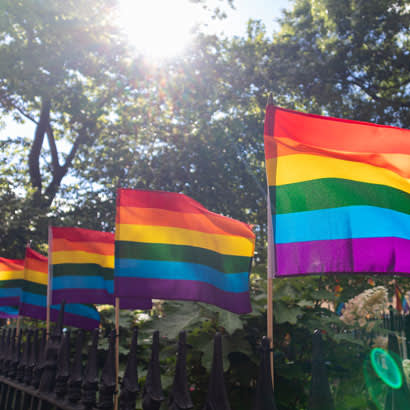
Every year, LGBTQ+ people and allies look forward to the celebrations, parades and community-feeling offered by each June’s Pride Month events. This year, two years since the start of the COVID-19 pandemic, there is a greater yearning for coming together again after years of canceled events and isolation. My husband and I plan our Pride events months in advance — everything from the obligatory pre-parade brunch to the metro plan for our spot on the Washington, D.C. parade route, to attending our community’s first Pride event at the end of June in Loudoun County, Virginia. However, this year’s planning included another thought: what do we do in the event of an emergency?
Given the tragic mass shootings that have dominated recent weeks’ headlines, a colleague expressed hesitation at attending events like Pride, out of fear that there could be a mass shooting. That concern isn’t without merit. On June 12, 2016, 49 lives were taken at Pulse Nightclub, a gay club in Orlando, Florida, in an act of hate against the community. In 2019 and in 2022, arguments between people during Pride celebrations around a park in D.C.’s DuPont Circle led to a showing of a gun, fears of a shooting and people fleeing the scene — though thankfully no shots were fired in 2019 and a gun was not confirmed in 2022. Yet these fears do not deter many from showing up at Pride events across the country.
Coeur d’Alene, Idaho, is among many smaller cities hosting Pride events this year, far from Greenwich Village, New York City, where the first march occurred. On June 11, 2022, the city had its largest Pride attendance to date. The fact that this community in northern Idaho had this event and is seeing it grow over the years demonstrates the expanding acceptance and inclusivity of the LGBTQ+ community in more remote parts of the United States. However, as history has shown, the growth of a civil rights movement often brings a vocal, extremist opposition. At Coeur d’Alene’s Pride in the Park event, this dichotomy was on display. While Pride attendees enjoyed performances from drag queens, music, food and community, there was an armed counter-protest on the perimeter of the event holding homophobic and transphobic signs. About a half-mile from the event, 31 members of the white supremacist, hate group known as the Patriot Front, piled into the back of a U-Haul with plans to start a riot at the Pride event. Thanks to a witness tip, law enforcement was able to track the U-Haul and thwart the planned riot. These members were arrested and an investigation into the group is ongoing. Meanwhile, the Pride event carried on.
The story from Coeur d’Alene shows the perseverance of the LGBTQ+ community, which runs deep to the roots of the movement. Long has the community encountered violence and harassment from white supremacists. White supremacy, based on race and ethnicity, has grown to be about more than just race. As the Nazi’s perpetrated the genocide against the Jewish community in the 1940s in the name of white supremacy, they also imprisoned, enslaved and murdered LGBTQ+ people, branding them with a pink triangle — “the lowest of the low” according to scholars. From the riots and uprisings that took place in the 1960’s across the country, including, most notably, at the Stonewall Inn on June 28, 1969, to today’s events, the LGBTQ+ community has long faced harassment, discrimination and violence. Yet in the face of this and laws banning homosexuality, dressing in drag and same-gender public affection — and the resulting police brutality in enforcing those laws — the LGBTQ+ community has persevered.
In the middle of this is the role of our public spaces in creating inclusive, welcoming and safe programs and places for all. In previous years’ blog posts, NRPA members and staff have highlighted a variety of ways to support your local LGBTQ+ community members, which you can find listed below. Ultimately, it is the responsibility of the profession to reiterate and ensure that LGBTQ+ people are welcome and safe in public spaces, but this isn’t without its challenges. Through community policing, relationship building and community-driven solutions, park and recreation professionals do not need to take on these challenges alone. Parks and recreation is often left to respond to many societal challenges, and collaboration among community groups, law enforcement and parks can create safe and inclusive solutions that best fit the needs of the community.
Whether this is the first year your community is hosting a Pride event or its fifty-second, it is essential to keep the tradition going because parks are at the heart of community and they’re at the heart of Pride. In the face of hate, parks and recreation perseveres and we’re stronger for it.
For further discussion, join the Pride in Parks: Spaces of Joy and Resistance upcoming discussion and Q&A.
NRPA LGBTQ+ Resources
- Pride in Parks: The Role of Parks in the Pride Movement and Supporting the LGBTQ+ Community
- This Pride Month Make a Commitment to Being LGBTQ Affirming
- This Pride Month Is Different
- Giving a Voice to LGBTQ+ Older Adults of Color
- Supporting the LGBTQ+ Community Through Parks and Recreation
- Fostering an LGBTQ+ Inclusive Environment in Parks and Recreation - Episode 094
Jared Mummert (he/him) is a program manager for community and environmental resilience at NRPA.

